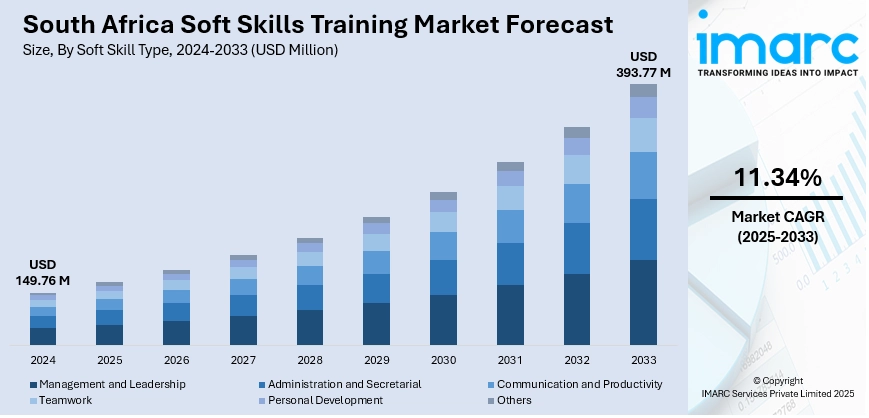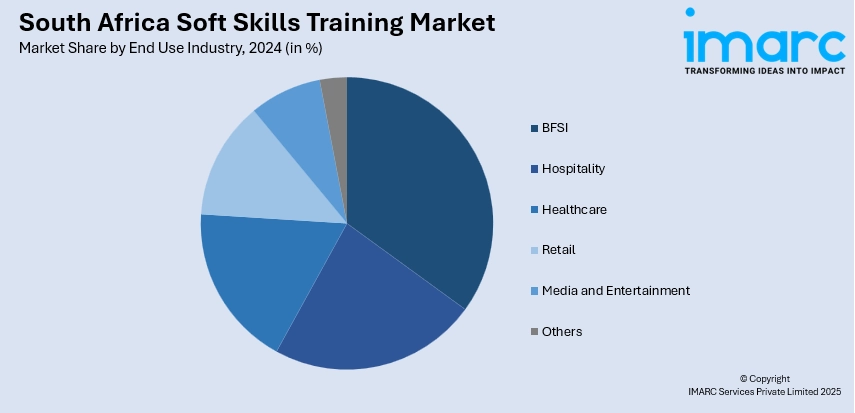
South Africa Soft Skills Training Market Size, Share, Trends and Forecast by Soft Skill Type, Channel Provider, Sourcing, Delivery Mode, End Use Industry, and Province, 2025-2033
South Africa Soft Skills Training Market Overview:
The South Africa soft skills training market size reached USD 149.76 Million in 2024. The market is projected to reach USD 393.77 Million by 2033, exhibiting a growth rate (CAGR) of 11.34% during 2025-2033. At present, rising adoption of remote and hybrid work arrangements is creating new challenges in communication, collaboration, and self-management that require targeted skill development. In addition, the growing employment of artificial intelligence (AI), which aids in handling more technical and repetitive tasks, is contributing to the expansion of the South Africa soft skills training market share.
|
Report Attribute
|
Key Statistics
|
|---|---|
|
Base Year
|
2024
|
|
Forecast Years
|
2025-2033
|
|
Historical Years
|
2019-2024
|
| Market Size in 2024 | USD 149.76 Million |
| Market Forecast in 2033 | USD 393.77 Million |
| Market Growth Rate 2025-2033 | 11.34% |
South Africa Soft Skills Training Market Trends:
Growing adoption of remote and hybrid work arrangements
Rising adoption of remote and hybrid work models is fueling the market growth in South Africa. According to the findings of the survey done by PwC, in 2024, regarding hybrid work, among 2000 South African respondents, 59% supported hybrid working arrangements. As more companies are using flexible work arrangements, employees need to adjust to virtual interactions, manage their time effectively, and maintain productivity without direct supervision. Soft skills, such as emotional intelligence, adaptability, digital communication, and problem-solving, are becoming essential in remote settings where traditional face-to-face support is limited. Employers are recognizing that success in hybrid environments depends not just on technical proficiency but also on strong interpersonal and organizational abilities. This awareness is leading to increased investments in training programs that emphasize virtual collaboration, conflict resolution, and online meeting etiquette. Managers also require leadership training tailored to managing dispersed teams and maintaining engagement across digital platforms. The shift away from physical office spaces highlights the importance of self-motivation and accountability, which are key areas of focus in soft skills training. Training providers are responding by offering flexible, digital courses that accommodate different schedules and learning styles.

To get more information on this market, Request Sample
Increasing use of AI
Rising use of AI is impelling the South Africa soft skills training market growth. As AI and automation handle more technical and repetitive tasks, employers increasingly value soft skills like communication and emotional intelligence, which cannot be easily replicated by machines. This shift is encouraging organizations to wager on soft skills training to prepare their workforce for future roles. AI tools also support the delivery of soft skills training by offering personalized learning experiences, real-time feedback, and interactive simulations that enhance engagement and retention. Virtual coaching platforms powered by AI allow employees to practice scenarios and improve their responses in a safe environment. Furthermore, companies are utilizing AI-based analytics to assess skill gaps and measure training outcomes, making programs more targeted and efficient. As South African businesses strive to stay competitive in the market, the demand for a well-rounded, future-ready workforce continues to grow. This is increasing the importance of soft skills training, supported by AI that is transforming the nature of work. As per industry reports, the South Africa AI market size is set to attain USD 73,793.6 Million by 2033.
South Africa Soft Skills Training Market Segmentation:
IMARC Group provides an analysis of the key trends in each segment of the market, along with forecasts at the country and regional levels for 2025-2033. Our report has categorized the market based on soft skill type, channel provider, sourcing, delivery mode, and end use industry.
Soft Skill Type Insights:
- Management and Leadership
- Administration and Secretarial
- Communication and Productivity
- Teamwork
- Personal Development
- Others
The report has provided a detailed breakup and analysis of the market based on the soft skill type. This includes management and leadership, administration and secretarial, communication and productivity, teamwork, personal development, and others.
Channel Provider Insights:
- Corporate/Enterprise
- Academic/Education
- Government
A detailed breakup and analysis of the market based on the channel provider have also been provided in the report. This includes corporate/enterprise, academic/education, and government.
Sourcing Insights:
- In-house
- Outsourced
A detailed breakup and analysis of the market based on the sourcing have also been provided in the report. This includes in-house and outsourced.
Delivery Mode Insights:
- Online
- Offline
A detailed breakup and analysis of the market based on the delivery mode have also been provided in the report. This includes online and offline.
End Use Industry Insights:

- BFSI
- Hospitality
- Healthcare
- Retail
- Media and Entertainment
- Others
A detailed breakup and analysis of the market based on the end use industry have also been provided in the report. This includes BFSI, hospitality, healthcare, retail, media and entertainment, and others.
Province Insights:
- Gauteng
- KwaZulu-Natal
- Western Cape
- Mpumalanga
- Eastern Cape
- Others
The report has also provided a comprehensive analysis of all the major regional markets, which include Gauteng, KwaZulu-Natal, Western Cape, Mpumalanga, Eastern Cape, and others.
Competitive Landscape:
The market research report has also provided a comprehensive analysis of the competitive landscape. Competitive analysis such as market structure, key player positioning, top winning strategies, competitive dashboard, and company evaluation quadrant has been covered in the report. Also, detailed profiles of all major companies have been provided.
South Africa Soft Skills Training Market News:
- In February 2025, m Lab and Edunova partnered to introduce ‘Skills Training and Enterprise Placement to Unleash Potential (Step Up),’ a fresh initiative aimed at providing youth who were not in employment, education, or training (NEETs) with the skills and chances necessary to engage in South Africa's digital economy. Edunova, an expert in digital skills education, would provide participants with crucial digital literacy, cloud computing credentials, and employability soft skills throughout a duration of six months.
South Africa Soft Skills Training Market Report Coverage:
| Report Features | Details |
|---|---|
| Base Year of the Analysis | 2024 |
| Historical Period | 2019-2024 |
| Forecast Period | 2025-2033 |
| Units | Million USD |
| Scope of the Report |
Exploration of Historical Trends and Market Outlook, Industry Catalysts and Challenges, Segment-Wise Historical and Future Market Assessment:
|
| Soft Skill Types Covered | Management and Leadership, Administration and Secretarial, Communication and Productivity, Teamwork, Personal Development, Others |
| Channel Providers Covered | Corporate/ Enterprise, Academic/ Education, Government |
| Sourcings Covered | In-house, Outsourced |
| Delivery Modes Covered | Online, Offline |
| End Use Industries Covered | BFSI, Hospitality, Healthcare, Retail, Media and Entertainment, Others |
| Provinces Covered | Gauteng, KwaZulu-Natal, Western Cape, Mpumalanga, Eastern Cape, Others |
| Customization Scope | 10% Free Customization |
| Post-Sale Analyst Support | 10-12 Weeks |
| Delivery Format | PDF and Excel through Email (We can also provide the editable version of the report in PPT/Word format on special request) |
Key Questions Answered in This Report:
- How has the South Africa soft skills training market performed so far and how will it perform in the coming years?
- What is the breakup of the South Africa soft skills training market on the basis of soft skill type?
- What is the breakup of the South Africa soft skills training market on the basis of channel provider?
- What is the breakup of the South Africa soft skills training market on the basis of sourcing?
- What is the breakup of the South Africa soft skills training market on the basis of delivery mode?
- What is the breakup of the South Africa soft skills training market on the basis of end use industry?
- What is the breakup of the South Africa soft skills training market on the basis of province?
- What are the various stages in the value chain of the South Africa soft skills training market?
- What are the key driving factors and challenges in the South Africa soft skills training market?
- What is the structure of the South Africa soft skills training market and who are the key players?
- What is the degree of competition in the South Africa soft skills training market?
Key Benefits for Stakeholders:
- IMARC’s industry report offers a comprehensive quantitative analysis of various market segments, historical and current market trends, market forecasts, and dynamics of the South Africa soft skills training market from 2019-2033.
- The research report provides the latest information on the market drivers, challenges, and opportunities in the South Africa soft skills training market.
- Porter's five forces analysis assist stakeholders in assessing the impact of new entrants, competitive rivalry, supplier power, buyer power, and the threat of substitution. It helps stakeholders to analyze the level of competition within the South Africa soft skills training industry and its attractiveness.
- Competitive landscape allows stakeholders to understand their competitive environment and provides an insight into the current positions of key players in the market.
Need more help?
- Speak to our experienced analysts for insights on the current market scenarios.
- Include additional segments and countries to customize the report as per your requirement.
- Gain an unparalleled competitive advantage in your domain by understanding how to utilize the report and positively impacting your operations and revenue.
- For further assistance, please connect with our analysts.
 Request Customization
Request Customization
 Speak to an Analyst
Speak to an Analyst
 Request Brochure
Request Brochure
 Inquire Before Buying
Inquire Before Buying




.webp)




.webp)












